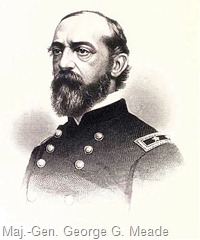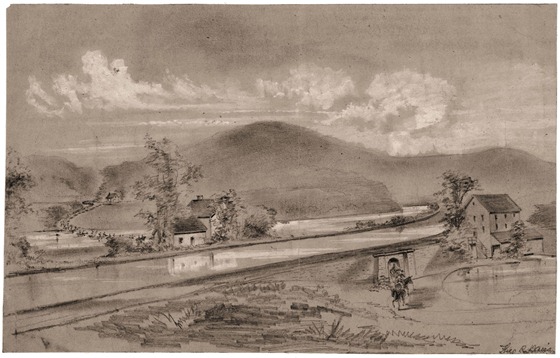October 10, Friday. Some vague and indefinite tidings of a victory by Buell in Kentucky in a two days’ fight at Perryville. We hear also of the capture of batteries by the Navy on the St. John’s in Florida, but have no particulars.
A telegram from Delano[1] at New Bedford tells me that the pirate or Rebel steamer 290, built in Great Britain and manned by British seamen, fresh from England, has captured and burnt five whaling vessels off the Western Islands. The State Department will, I suppose, submit to this evidence that England is an underhand auxiliary to the Rebels, be passive on the subject, and the Navy Department will receive as usual torrents of abuse.
At Cabinet to-day, among other subjects, that of trade at Norfolk was under consideration. We were told the people are in great distress and trouble, cannot get subsistence nor make sale of anything by reason of the blockade. Chase thought it very hard, was disposed to open the port or relax the blockade. Stanton opposed both; said Norfolk was hot with rebellion, and aid to Norfolk would relieve Richmond. The President, in the kindness of his heart, was at first inclined to grant relief. Chase said I had instructed the squadron to rigidly enforce the blockade. I admitted this to be true as regarded Norfolk and all the blockaded ports, and assured him I should not relax unless by an Executive order, or do otherwise until we had another policy. That to strictly maintain the blockade caused suffering I had no doubt; that was the chief object of the blockade. I was doing all in my power to make rebellion unpopular, and as a means, I would cause the whole insurrectionary region to suffer until they laid down their arms and became loyal. The case was not one of sympathy but of duty. Chase urged that they might be permitted to bring out and exchange some of their products, such as shingles, staves, tar, etc., which they could trade for necessaries that were indispensable. “Then,” said I, “raise the blockade. Act in good faith with all; let us have no favoritism. That is my policy. You must not use the blockade for domestic traffic or to enrich a few.”
The President said these were matters which he had not sufficiently considered. My remarks had opened a view that he had not taken. He proposed that Seward and Chase should see what could be done.
There is, I can see, a scheme for permits, special favors, Treasury agents, and improper management in all this; not that Chase is to receive any pecuniary benefit himself, but in his political aspirations he is courting, and will give authority to, General Dix, who has, he thinks, political influence. It is much less, I apprehend, than Chase supposes. Dix is, I presume, as clear of pecuniary gain as Chase, but he has on his staff and around him a set of bloodsuckers who propose to make use of the blockade as a machine to enrich themselves. A few favorites design to monopolize the trade of Norfolk, and the Government is to be at the expense of giving them this monopoly by absolute nonintercourse, enforced by naval vessels to all but themselves. As we have absolute possession of Norfolk and its vicinity, there is no substantial reason for continuing the blockade, and it can benefit none but Army and Treasury favorites. General Dix has, I regret to see, lax notions. Admiral Lee holds him in check; he appeals to Chase, who is very severe towards the Rebels, except in certain matters of trade and Treasury patronage carrying with them political influence.
Seward wishes me to modify my second letter on the subject of instructions under the British slavery treaty, so as to relieve him in a measure. I have no objection; he does not appear to advantage in the proceedings. In a scheme to obtain popularity for himself, he has been secretive, hasty, inconsiderate, overcunning, and weak. The Englishmen have detected his weak side and taken advantage of it. His vanity and egotism have been flattered, and he has undertaken an ostentatious exhibition of his power to the legations, and at the same time would secure favor with, the Abolitionists and Anti-Slavery men by a most singular contrivance, which, if carried into effect, would destroy our naval efficiency. His treaty binds us to surrender for a specific purpose the general belligerent right of search in the most important latitudes. The effect would be in the highest degree advantageous to the Rebels, and wholly in their interest. It seems to me a contrivance to entrap our Government, into which the Secretary of State, without consulting his associates, has been unwittingly seduced.
D. D. Porter left Wednesday to take command of the Mississippi Squadron, with the appointment of Acting Admiral. This is an experiment, and the results not entirely certain. Many officers of the Navy who are his seniors will be dissatisfied, but his juniors may, by it, be stimulated. The river naval service is unique. Foote performed wonders and dissipated many prejudices. The army has fallen in love with the gunboats and wants them in every creek. Porter is wanting in some of the best qualities of Foote, but excels him perhaps in others. The service requires great energy, great activity, abundant resources. Porter is full of each, but is reckless, improvident, often too presuming and assuming. In an interview on Wednesday, I endeavored to caution him on certain points and to encourage him in others. In conformity with his special request, General McClernand is to command the army with which the Navy cooperates. This gratifies him, for he dreads and protests against association with any West Point general; says they are too self-sufficient, pedantic, and unpractical.
The currency and financial questions will soon be as troublesome as the management of the armies. In making Treasury notes or irredeemable paper of any kind a legal tender, and in flooding the country with inconvertible paper money down to a dollar and fractional parts of a dollar, the Secretary of the Treasury may obtain momentary ease and comfort, but woe and misery will follow to the country. Mr. Chase has a good deal of ability, but has never made finance his study. His general ideas appear to be crudely sound, but he does not act upon them, and his principal and most active and persistent advisers are of a bad school. The best and soundest financiers content themselves with calmly stating sound financial truths. He has not made his plans a subject of Cabinet consultation. Perhaps it is best he should not. I think he has advised with them but little, individually. Incidentally he and I have once or twice had conversations on these matters, and our views appeared to correspond, but when he has come to act, a different policy has been pursued. It will add to the heavy burdens that overload the people.
Singular notions prevail with some of our Cabinet associates, — such as have made me doubt whether the men were serious in stating them. On one occasion, something like a year ago, Smith expressed a hope that the Treasury would hasten, and as speedily as possible get out the fractional parts of a dollar, in order to put a stop to hoarding. Chase assured Smith he was hurrying on the work as fast as possible. I expressed astonishment and regret, and insisted that the more paper he issued, the more hoarding of coin there would be and the less money we should have; that all attempts in all countries and times to cheat gold and silver had proved failures and always would; that money was one thing and currency another; convertible paper was current for money, inconvertible paper was not; that two currencies could not circulate at the same time in any community; that the vicious and poor currency always superseded the better, and must in the nature of things.
Chase, without controverting these remarks, said I belonged to the race of hard-money men, whose ideas were not exactly adapted to these times. Smith was perfectly confident that hoarding up money would cease when there was no object in it, and if the Treasury would furnish us with paper there would be no object to hoard. He was confident it would do the work. I asked Chase if he indorsed such views, but could get no satisfactory answer. The Treasury is pursuing a course which will unsettle all values.
[1] B. F. Delano, Naval Constructor.











